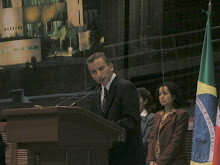Miguel Angel Asturias is a Guatemalan writer distinguished by his anti-imperialist ideas and by the differences that he made between the poor people and the government. He won the litarature nobel price in 1967 and was a politician in the Guatemalan government, ambassador in Mexico, Argentina and El Salvador. In 1946 he wrote The president, a novel that ridicules the dictator figure, describes the situation of the poor people and the corruption that the government had. The author didn’t mention it in the book, but is deductible that the novel he was referring to the dictatorship that Manuel Estrada assumed in Guatemala at the beginning of the 19 century when Asturias was a teenager.
First of all, the author makes a differentiation between good and evil… Evil is performed by The President, a figure characterized by terror, corruption, tyranny and a system controlled by the force. In the other hand, the light or the good is played by the poor people, the homeless man who was tortured because he didn’t want to lie or Angel Face, who is described as a compassionate individual.
It seems that the most representative part in the first half of the book is the chapter when “Mosquito” dies, that because it is the best example of how the dictator acts in order to achieve his personal goals instead of the country’s goals. In addition, this passage represents the corruption in which Guatemala was living and the situation of the poor people. It also exemplifies the political situation, where the dictator did what he wanted without limits.
The book is confusing because it has a lot of characters who has little contribution to the story, because of that; it was very difficult to read and to understand the roll of all the characters and all the situations. In terms of style, it’s very interesting how this book has some surrealistic parts and some elements that the author used to make fun of the presidents figure.
In the first half of the book it is clearly perceived the denounce style against the authoritarian government’s cruelty. This analysis is about a protest novel that was written among the fantasy and the language. Asturias had a commitment with the history, but he used the surrealistic and poetics forms to develop the argument. However, there are many real factors of the politic and social context which figure out the situation in the Latin American history.
Finally, it is a dichotomy between freedom and integrity. In Mosquito’s death and in the Fedina’s torture, what was more important for them, to don’t lie or to be free? What to do in facing that problem? Nowadays we are capable of been honest free at the same time, but at the beginning of the 19 century, what could have been the right thing to do be true or be free? On the other hand, it is difficult to know if Mosquito or Ferina would have been free is the lie that because they would have had a lot of information against the dictator that could hazard the system.
Subscribe to:
Post Comments (Atom)

3 comments:
I agree that the president conducts a system controlled by force. I also agree with you that the chapter when Mosquito dies exemplifies this force because an innocent man (one who couldn’t even see who assassinated Sonriente) dies at the mercy of the dictator who has no regard for the country’s goals and would rather satisfy his personal goals regardless of what is right or moral.
I agree that the death of the Mosquito is a very good example of the President's dictatorship.. Also, the incident took place at the very beginning of this novel and this helps the readers to understand the President's character (use his power to achieve personal goals as you stated) and to get an idea of what this book is about.
I agree with Bessie. The death of Mosquito was a fantastic way to show how it was at that time. Quite sad actually. I think that he deaths of different characters all have different yet connected meaning in the book.
Post a Comment